What is shoulder arthroscopy?
Shoulder arthroscopy is a subset of shoulder surgery that Dr. Gombera performs using an arthroscope, a tiny surgical camera. Dr. Gombera inserts this camera into the shoulder through a small incision, allowing him to observe the injured area.
When is shoulder arthroscopy used?
Dr. Gombera recommends shoulder arthroscopy for shoulder pain centered around injury, wear and tear, and similar age-related ailments affecting the shoulder. You might be a good candidate for an arthroscopic procedure if you need one of the following performed:
- Repairs to your rotator cuff
- Removal of bone spurs
- Labrum removal or repair
- Ligament or cartilage repair
- A repair for shoulder dislocation
What can I expect during shoulder arthroscopy recovery?
Arthroscopic shoulder procedures generally allow for faster recovery than open shoulder surgeries. Nonetheless, you can expect to spend several weeks at home recovering following surgery.
Many patients find pain to be minimal following surgery, but you might find yourself in moderate pain for a week or two if your procedure was more extensive. If you find this is the case, Dr. Gombera can prescribe pain medication for the recovery period.
Your arm will be immobilized in a sling for the first few weeks of recovery, so plan your return to work accordingly. Physical activities such as sports should be avoided until you receive clearance from Dr. Gombera.
Is physical therapy required following shoulder arthroscopy?
Despite arthroscopic procedures proving a less intensive procedure than open shoulder surgery, physical therapy still plays an important role in your recovery. You’ll be assigned a physical therapist who will develop an exercise regimen that will strengthen your shoulder and help you recover faster.
Are my shoulder arthroscopy results permanent?
Most repairs performed by Dr. Gombera will be permanent in nature. However, recovery for each patient is different and any additional injuries or physical exertion that occurs following your surgery can re-aggravate the area.
If you’re concerned that you’ll reinjure the area, speak with your physical therapist. Strength and muscle training can help stave off an injury in your shoulder.




